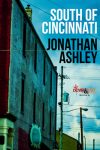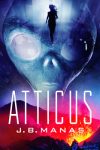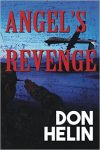

August 7 – 13: “How many thrillers do you read each year?”
 How many thrillers do you read each year? How do you choose from the vast selection? Those are the questions this week for ITW Members Don Helin, Jonathan Ashley, J. B. Manas and Danny Lopez. Scroll down and click on “Comments” to read what they have to say.
How many thrillers do you read each year? How do you choose from the vast selection? Those are the questions this week for ITW Members Don Helin, Jonathan Ashley, J. B. Manas and Danny Lopez. Scroll down and click on “Comments” to read what they have to say.
~~~~~
 Jonathan Ashley is the author of Out of Mercy and The Cost of Doing Business. His work has appeared in Crime Factory, Out of the Gutter, A Twist of Noir, LEO Weekly, Kentucky Magazine, and Yellow Mama. He lives in Lexington, KY.
Jonathan Ashley is the author of Out of Mercy and The Cost of Doing Business. His work has appeared in Crime Factory, Out of the Gutter, A Twist of Noir, LEO Weekly, Kentucky Magazine, and Yellow Mama. He lives in Lexington, KY.
 J. B. Manas is a Philadelphia-based author of fiction and nonfiction. He is the author of the new sci-fi thriller, ATTICUS, and co-author of The Kronos Interference, named to the “Best of 2012” by Kirkus Reviews, which gave the book a starred review, calling it “impressively original” and “[a] tour de force.” His nonfiction books (written as Jerry Manas) on leadership lessons from history, science, and the arts have been translated into eight languages and course-adopted in universities worldwide. Manas writes out of his home in suburban Philadelphia, where he lives with his wife, daughter, and dog Kayla, an American Dingo rescued from the swamps of South Carolina. He is a member of the Authors’ Guild, International Thriller Writers (ITW), and the Association of Former Intelligence Officers (AFIO).
J. B. Manas is a Philadelphia-based author of fiction and nonfiction. He is the author of the new sci-fi thriller, ATTICUS, and co-author of The Kronos Interference, named to the “Best of 2012” by Kirkus Reviews, which gave the book a starred review, calling it “impressively original” and “[a] tour de force.” His nonfiction books (written as Jerry Manas) on leadership lessons from history, science, and the arts have been translated into eight languages and course-adopted in universities worldwide. Manas writes out of his home in suburban Philadelphia, where he lives with his wife, daughter, and dog Kayla, an American Dingo rescued from the swamps of South Carolina. He is a member of the Authors’ Guild, International Thriller Writers (ITW), and the Association of Former Intelligence Officers (AFIO).
 Danny López is a pen name. The author was raised in Mexico, Texas, and Florida. He worked numerous menial jobs before becoming a photojournalist, which allowed him to travel around the U.S., Mexico and the Caribbean and meet many of the characters that populate his stories. THE LAST GIRL is his first Dexter Vega novel.
Danny López is a pen name. The author was raised in Mexico, Texas, and Florida. He worked numerous menial jobs before becoming a photojournalist, which allowed him to travel around the U.S., Mexico and the Caribbean and meet many of the characters that populate his stories. THE LAST GIRL is his first Dexter Vega novel.
 Using his experience from the military, including eight years in the Pentagon, Don Helin published his first thriller, Thy Kingdom Come, in 2009. His second, Devil’s Den, was selected as a finalist in the 2013 Indie Book Awards. His latest thriller, Secret Assault was selected as the best Suspense/Thriller at the 2015 Indie Book Awards. Don is an active member of International Thriller Writers, Military Writers Society of America, Pennwriters, a state-wide writers group in Pennsylvania, and a mentor with the Mystery Writers of America. He makes his home in central Pennsylvania where he is hard at work on his next thriller, Long Walk Home.
Using his experience from the military, including eight years in the Pentagon, Don Helin published his first thriller, Thy Kingdom Come, in 2009. His second, Devil’s Den, was selected as a finalist in the 2013 Indie Book Awards. His latest thriller, Secret Assault was selected as the best Suspense/Thriller at the 2015 Indie Book Awards. Don is an active member of International Thriller Writers, Military Writers Society of America, Pennwriters, a state-wide writers group in Pennsylvania, and a mentor with the Mystery Writers of America. He makes his home in central Pennsylvania where he is hard at work on his next thriller, Long Walk Home.
- LAST GIRL MISSING with K.L. Murphy - July 25, 2024
- CHILD OF DUST with Yigal Zur - July 25, 2024
- THE RAVENWOOD CONSPIRACY with Michael Siverling - July 19, 2024
